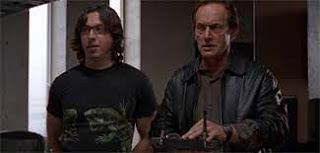Directed by Allen Coulter
Written by Glen Morgan and James Wong
Air Date: March 20, 1998
Guest Star: Vivian Wu (Tamara Shui Fa Lee)
"Siren" explores some areas the show had not explored up to that point, but the plot takes a turn towards well worn territory in the journey of Frank Black, protagonist of the series.
The cold open is set aboard a cargo ship bound for Seattle that's smuggling people fleeing from China. Customs officials inspect the ship and find a woman chained in the cargo area, a woman the captain blames for several deaths onboard on the ship. Later on at the hospital, Jordan spots the young woman and informs Catherine the woman may help Frank at some point. Once informed, Frank and Lara begin to investigate mysterious occurrences aboard the ship.
In a brief exchange, Lara muses on the sacrifices and risks many take in coming to the United States, Frank observes "humans are drawn towards the light." If the 1990s was the Pax Americana, a period when immigration rates continued to rise, I feel like there was an opportunity explore the idea further. The episode never goes into xenophobic territory, the theme of immigration and changing American identity during the 1990s, gets set aside in favor of Frank's narrative.
Unable to discover any useful leads to the woman's identity, Frank questions her at the hospital. She speaks English and seems to know everything about Frank's past. After leaving, Frank sees her on the highway and stops his car, but notices she's vanished. Then in what turns out to be visions, Frank imagines an alternate life when he's reconciled with Catherine and not associated with the group, a vision that ends with a terrifying image. Many make comparisons to It's a Wonderful Life, but The Last Temptation of Christ also comes to mind.
Frank's frequent agonizing over whether he's doing what's right for his family has been a sustaining theme, but here it starts to feel a bit repetitive. An uneven entry, but worth watching for Frank's vision of an alternate reality.






